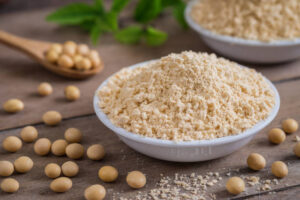One of the most significant protein sources for the human body, soybeans provide enough of the essential amino acids. Their high fiber content benefits the digestive system and heart health.
Foods containing it include milk, tofu, baked bread, and cereals that ideally have soy. Soy is most typically consumed as a plant protein because it consists of all nine required amino acids, which are the building blocks of protein. We’ll discuss some of the immense benefits of soy down below
Benefits of Soy

Skin Benefits
Since soy contains anti-inflammatory, collagen-stimulating, antioxidant, skin-whitening, and UV protection qualities, it’s perfect for the skin. Moreover, soy contains bioactive compounds like:
- Proanthocyanidins
- Isoflavonoids
- Tannic acid
- Trypsin blockers
According to reports, dermatitis and cosmetology can both benefit from soy extracts. Soybean trypsin inhibitors, a particular protein in soybeans, were found to have depigmenting characteristics.
Additionally, it has been demonstrated that they reduce pigment deposition. The anthocyanins in soybeans also hinder the production of melanin. Also, according to several American papers on soy, soybean extracts reduce wrinkles and inflammation brought on by UV radiation. They also enhance collagen and skin elasticity. Given their prominence and benefits, you can always get high-quality US soy latest recipes to incorporate in your diet.
Benefits of Soy in Your Diet
-
Diabetes Prevention
The management of blood glucose in type 2 diabetic individuals can be improved by including soybeans in your diet. Minerals, dietary fiber, complex carbohydrates, and protein in the component can all contribute to this. Soy may also be advantageous because of the phytoestrogens and soy peptides they contain. Some beans have a lower glycemic index which is nominally beneficial for people with diabetes.
Phytochemicals, which are potent antioxidants, are present in soybeans. By consuming them, diabetics can be protected from oxidative damage, which can exacerbate diabetes. These beans may also treat hyperlipidemia, impaired glucose tolerance, and insulin resistance.
Unexpectedly, fermented soybean products—like natto, tempeh, doenjang, and kochujang—work better as anti-diabetic drugs. This is most likely because it has been demonstrated that fermentation alters the molecular structure of isoflavonoids, which is essential for diabetic patients.

2. Heart Health
Since soybean is a plant-based protein with many lipids, it has long been utilized in East Asian cooking to keep the heart healthy. It has gained attention for several benefits, including lowering cholesterol, avoiding cancer, and enhancing heart health. Compared to other foods in the same category, it has a lower Glycemic Control Index, which may be advantageous for regulating blood sugar levels (dairy milk). Moreover, it guards against osteoporosis.
However, excessive consumption can affect thyroid and metabolic functions. It is, therefore, not risk-free. The genetic diversity among regional populations with shifting soy consumption patterns affects the statistics differently.
3.Hormonal Balance
Soybeans also contain isoflavones, which act as phytoestrogens. These chemical substances have specific effects on the uterine lining and perhaps other hormone-dependent tissues because they mimic the effects of estrogens produced by the body.
Because estrogen promotes cell proliferation, which affects tissue regeneration, isoflavones may benefit premenstrual syndrome (PMS) associated with heavy periods. Research indicates soy has benefits comparable to hormone replacement therapy (HRT).

4.Kidney Health
Your kidneys aid in the disposal of waste from your body and the filtration of your blood; hence they need to be adequately maintained. You’re also susceptible to many health problems without healthy kidneys. Although soy won’t improve kidney issues, it might lessen adverse effects.
Many studies have showcased that soy protein consumers with chronic renal impairment had decreased blood levels of phosphorus, lipids, and creatinine. The improvement of renal function may be aided by lowering these levels.
5.Fertility
Soy is known to improve a woman’s chance of getting pregnant through in vitro fertilization rise. This, according to researchers, is because soy’s isoflavones help BPA’s endocrine-disrupting effects to be lessened.
According to research, the intake of soy isoflavones greater than 100 mg daily, or 6 ounces of raw tempeh or 16 cups of soy milk, has been linked to impaired ovarian function. On the other hand, moderate soy consumption did not raise any issues.
Additionally, menopausal hot flashes can be uncomfortable and bothersome, but soy can help you immensely. Some people might benefit from it. Menopausal women who ingested the most soy may experience fewer hot flashes and nocturnal sweat

6.Digestive System
One of the elements most frequently absent from many people’s diets is dietary fiber. Fiber gives your stool bulk, making it easier to go through your digestive tract. It can also encourage peristaltic motion when the muscles that move things through your system tense.
Soybean is highly rich in fiber. A healthy body, especially the digestive system, depends on thread, and soy provides it adequately.
Conclusion
Since soy is rich in every possible nutrient and highly beneficial to your body, incorporating it into your diet will improve your health immensely. Keeping the benefits in mind, you can use the ingredient to enrich you according to your requirements.



